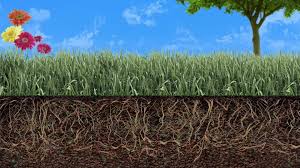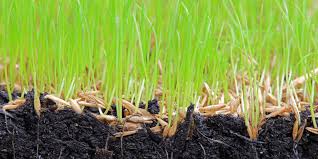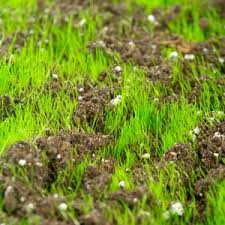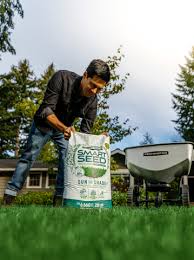Penn Mulch Grass is a helpful thing for growing gardens. People use it to make their plants happy. It’s like a blanket for the ground that keeps plants cozy. When you put Penn Mulch on the dirt, it stops weeds from popping up and stealing the sunlight. This makes the plants you want to grow have more space and light to be strong.
Penn Mulch Grass is good because it’s friendly to the Earth. It’s made from recycled paper, which is way better than throwing it away. The paper turns into mulch that helps plants without hurting the environment. It’s like giving a gift to the Earth and your garden at the same time.
Using Penn Mulch Grass is really easy. First, you need to prepare your garden. Make sure the dirt is smooth and ready for the mulch. Then, take the Penn Mulch and spread it over the dirt like you’re making a cozy bed. You can use your hands or a little rake. Just make sure the mulch covers the dirt nicely.
Once the Penn Mulch is in place, it does a lot of good things. It keeps the dirt from getting too hot or too cold, which plants don’t like. It also keeps water from evaporating too quickly, so the plants can drink it when they’re thirsty. And remember those pesky weeds? The mulch keeps them hidden, so your plants don’t have to share the sunlight.
Another great thing about Penn Mulch Grass is that it breaks down over time. As it does, it gives the soil some tasty treats that make plants happy. This helps the soil stay healthy and full of good things for your plants to eat.
So, if you want a garden that’s happy and healthy, think about using Penn Mulch Grass. It’s like a magic carpet that makes your plants smile. Just spread it, water your plants, and watch them grow big and strong.
Read Also: Holly Flowers (Ilex): All You Need To Know About
How to Use the Penn Mulch

Here’s a simple guide:
1. Prepare Your Garden: Make sure the area where you want to use Penn Mulch is ready. Clear away any weeds or debris so that the soil is nice and clean.
2. Choose the Right Time: It’s best to apply Penn Mulch when the soil is slightly damp, but not too wet. This helps the mulch stick to the soil and stay in place.
3. Spread the Mulch: Take a handful of Penn Mulch and gently spread it over the soil. You want to create a layer that’s about 2 to 3 inches thick. Make sure you cover the entire area where you want to prevent weeds and retain moisture.
4. Smooth it Out: Use a rake or your hands to spread the mulch evenly. This helps it provide a consistent layer of protection and insulation for your plants.
5. Around Plants: When applying Penn Mulch around plants, keep a little distance from the stems to prevent rot. Leave a small gap between the mulch and the base of the plants.
6. Water the Mulch: After applying Penn Mulch, give it a gentle sprinkle of water. This helps the mulch settle and adhere to the soil.
7. Maintain: Over time, the Penn Mulch will naturally break down and mix with the soil. As you water your garden, the mulch will continue to provide nutrients to the plants.
Remember, Penn Mulch is like a cozy blanket for your garden. It helps to keep weeds away, maintains moisture in the soil, and adds nutrients as it decomposes. Using Penn Mulch is a simple way to promote healthy plant growth and make your garden look great.
Benefits of using Penn Mulch

Using Penn Mulch in your garden comes with several benefits which are:
1. Weed Control: Penn Mulch forms a protective barrier that prevents sunlight from reaching weed seeds, making it difficult for them to germinate and grow. This means less time and effort spent pulling weeds from your garden.
2. Moisture Retention: The mulch acts like a shield, helping to retain moisture in the soil. This is especially useful during hot and dry periods, as it reduces the need for frequent watering and keeps your plants hydrated.
3. Temperature Regulation: Penn Mulch provides insulation for the soil, keeping it cooler in the summer and warmer in the winter. This helps maintain a stable environment for plant roots, promoting healthier growth.
4. Erosion Prevention: The layer of mulch helps prevent soil erosion caused by heavy rain or wind. It keeps the soil in place and reduces the risk of losing valuable topsoil.
5. Nutrient Enhancement: As Penn Mulch breaks down over time, it adds organic matter to the soil. This enriches the soil with nutrients, promoting better plant growth and overall soil health.
6. Visual Appeal: A layer of mulch can instantly enhance the aesthetics of your garden. It provides a neat and tidy appearance while highlighting the beauty of your plants.
7. Soil Structure: The organic material in Penn Mulch improves soil structure, making it more crumbly and easy to work with. This allows roots to penetrate the soil more easily and encourages better air circulation.
8. Reduced Disease Spread: Using mulch can minimize the splash-back of soil-borne diseases onto plant leaves during rain or watering. This can help prevent the spread of certain plant diseases.
9. Sustainable Practice: Penn Mulch is typically made from recycled paper, making it an environmentally friendly choice. By using mulch, you’re contributing to recycling efforts and reducing waste.
10. Time and Labor Savings: With fewer weeds to contend with and less frequent watering needed, you’ll spend less time on maintenance tasks and more time enjoying your garden.
Overall, Penn Mulch offers a convenient and effective way to improve your garden’s health, reduce maintenance, and create a beautiful outdoor space. Whether you’re a seasoned gardener or just starting out, the benefits of using Penn Mulch are clear and valuable.
Where to Find Penn Mulch near Me/You

You can find and purchase Penn Mulch at various places:
1. Garden Centers: Local garden centers and nurseries often carry Penn Mulch. Visit these stores in your area to see if they have it in stock.
2. Home Improvement Stores: Large home improvement retailers often have gardening sections where you can find Penn Mulch.
3. Online Retailers: Websites like Amazon, Walmart, and other online gardening stores offer a wide range of gardening products, including Penn Mulch. You can easily browse and order from the comfort of your home.
4. Landscaping Suppliers: Some landscaping supply companies offer Penn Mulch in bulk quantities. Check with local suppliers to see if they carry it.
5. Farm Supply Stores: Stores that cater to farmers and gardeners may carry Penn Mulch as well. These stores often have a variety of gardening supplies.
6. Nurseries: Plant nurseries often have a selection of gardening supplies, including mulch options like Penn Mulch.
7. Cooperative Extension Offices: Sometimes, local cooperative extension offices or agricultural centers may sell gardening products like Penn Mulch.
8. Local Hardware Stores: Some local hardware stores carry gardening supplies, including mulch products.
Before purchasing, make sure to check the packaging to ensure that you are getting Penn Mulch specifically, as there are various types of mulch available. Additionally, consider the quantity you need based on the size of your garden or landscaping project.
Read Also: Significance and Uses of Single Roses
Cost of Penn Mulch

The cost of Penn Mulch can vary depending on factors such as the brand, quantity, and where you purchase it. On average, a bag of Penn Mulch may range from $5 to $10, but prices can be lower or higher based on your location and the retailer. Keep in mind that buying in bulk or larger quantities might offer cost savings per unit.
For the most accurate and up-to-date pricing information, it’s recommended to check with local garden centers, home improvement stores, online retailers, or other suppliers in your area. This will give you a better idea of the current cost of Penn Mulch and help you make an informed decision based on your budget and gardening needs.





